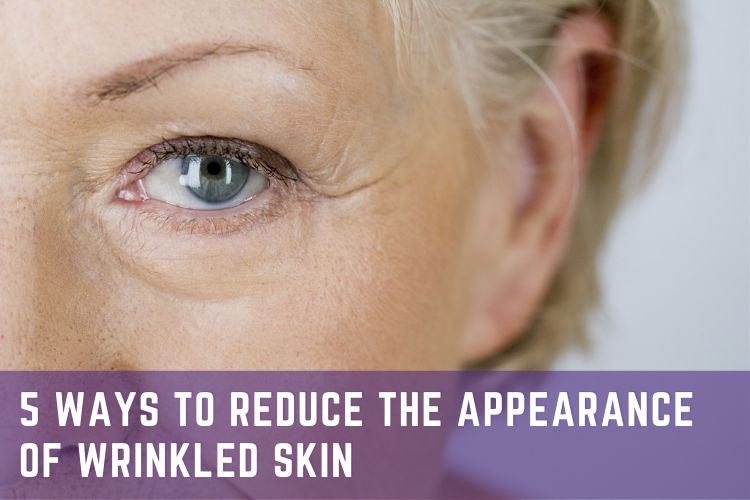5 Ways to Reduce the Appearance of Wrinkled Skin
Are you worried about your wrinkled skin and don't know what to do? Keep reading and learn how to treat your wrinkles here.

Did you know that you start losing collagen after the age of 34? Researchers found that peak collagen numbers were between 25 to 34, and over the next 40 years, you could lose almost 25 percent.
Collagen plays a critical role in that youthful glow you may be searching for. If you have wrinkled skin and time spent in quarantine has made you turn to Google for answers, we have you covered.
Even if you regularly see a dermatologist or plastic surgeon, quality skin care products can help slow down aging and promote healthier skin. Are you ready to get started?
We have put together a complete guide on how wrinkles occur and steps you can start taking today to combat them. Keep reading for more information!
What Are Skin Wrinkles?
Before diving into skin care for wrinkles, it helps to understand what wrinkles are and how they happen. Wrinkles can be any fold or crease in the skin. Facial wrinkles are one of the most common types, but you can also develop wrinkles in areas that are often exposed to the sun, such as:
- Neck
- Back of hands
- Arms
Wrinkles often develop as you age due to the skin losing collagen, elasticity, and plumpness. It will also dry out, and healthy skin will become more vulnerable to UV rays and other harmful exposures.
Facial expressions are one of the leading culprits. These repetitive movements, such as smiling or frowning, create creases around the eyes or mouth. When you are young, these wrinkles smooth out right away.
As you lose more elasticity, the creases will start deepening. Other than natural causes, here are a few other reasons why you develop skin wrinkles:
- Sun
- Smoking
- Dehydration
- Medications
Studies show that skin type plays a factor. Darker skin tones have more melanin and a thicker dermis than light-colored skin tones.
Wrinkled Skin Treatments
Having wrinkles doesn't necessarily mean you have unhealthy skin, but there are ways that you can help combat them and develop good skin care for wrinkles. Some of the most common wrinkle treatments include:
- Topical retinoids
- Antioxidant serums
- Moisturizers
- Dermabrasion or microdermabrasion
- Botox
- Chemical peels
- Invasive surgery
- Fillers
Skin treatments are often broken down into two main categories: invasive and non-invasive. Yet, even some cosmetic procedures that are minimally or non-invasive are costly and have side effects.
That leaves you with topical serums, creams, and moisturizers. Opting for high-quality skin care products can lead to a feeling of healthy skin with noticeable results.
Sun Protection
Choosing moisturizers with SPF or adding sunscreen into your daily skin care regimen can make a world of difference. Skin cancer is the most common cancer type, and unprotected skin is one of the main culprits.
Harmful UV rays can break down collagen and increase the amount of elastin. UV rays also lead to free radicals. These free radicals often damage neighboring cells and alter genetics, one of the leading causes of cancer.
Using sunscreen or moisturizers with SPF can help you:
- Reduce skin aging
- Reduce cancer risk
- Protect from sunburns
- Avoid damaged blood vessels
Oil-free facial sunscreen is one of the best options to go with. It won't increase oils on your face leading to a shiny appearance, and it can offer protection from UVA and UVB rays. Other key characteristics you should look for in your facial sunscreen are:
- Lightweight
- Absorbable
- Non-irritating
- Non-comedogenic
Good skin doesn't happen overnight, and wrinkles are sometimes inevitable, but taking the steps each day to implement SPF into your skin care habits can make one of the biggest differences!
Creating a Skin Care Routine
Moisturizers with SPF are only one piece of the puzzle to creating a good skin care routine. Taking time morning and evening can help treat wrinkles and give you a more youthful appearance.
All you will need is ten minutes twice a day to start noticing a difference. Here are some suggestions for a quality anti-aging skin care routine:
- Gentle cleansers
- Use cool water
- Retinoids
- Exfoliation
- Pat or tap products onto the face
- Ditch the washcloth
- Moisturize
- Face masks
Most times, rubbing your face or using scratchy washcloths can increase your risk for skin wrinkles and make them harder to treat. Instead, opt for a microfiber cloth or let your skin naturally dry.
Retinoids are another product that has anti-aging benefits and promotes collagen growth. You'll want to exercise some caution since these products are harder on sensitive skin.
Skin Care Products vs. Cosmetic Procedures
Skin care products and cosmetic procedures are different, but they go hand-in-hand. You'll want high-quality products after several facial cosmetic treatments such as microdermabrasion or chemical peels.
For example, microdermabrasion uses an applicator that helps sand away outer skin layers and dead cells. While it is becoming more popularized for treating age spots, wrinkles, and acne scarring, after-care is arguably the most critical part.
After these treatments, you can experience drier or more sensitive skin. You should immediately use gentle moisturizers and cleansers to help with recovery.
Finding Healthier Skin Care Products
Re-creating healthier skin starts with quality skin care products. If you deal with wrinkled skin and want solutions, there are several products that you can use daily to help reduce the appearance of fine lines and wrinkles and slow the aging process.
The most important thing is setting up a good routine that you feel comfortable using daily. Certain products like exfoliants and facial masks should be used sparingly. For help getting started with managing your wrinkles, check out our full line of anti-aging products on our website today!



